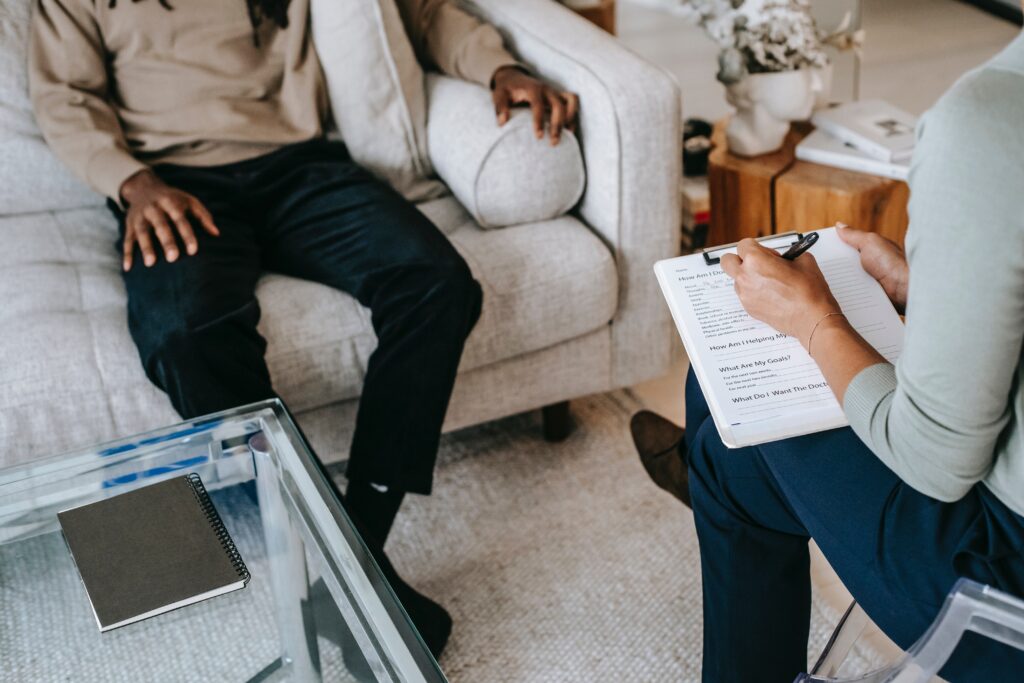Psychotherapy or sometimes referred to as ‘talking therapy’ offers support to people struggling with a wide range of emotional difficulties.
Psychotherapists facilitate counseling sessions. Therapy may be conducted on an individual basis, couple, family, or group setting, and supports both children and adults. In most cases, sessions typically last 50 minutes, but these can vary slightly in some circumstances.
There are many different types of therapies available and some work better than others depending on the individual’s needs and presenting issues. Other therapies available also include art, music, drama, and movement. To read about the different types of therapies read my blog
What therapy can help with?
Psychotherapy focuses on communication and allows you to discuss concerns that range from:
- Stress management – dealing with stressful situations or recovering from stress
- Relationship problems.
- Depression.
- Anxiety disorders and panic attacks
- An eating disorder.
- Phobias
- An addiction.
- Financial troubles.
- Feeling like you can’t cope
- Low self-esteem or extreme shyness
- Lack of confidence
- Coping with the effects of abuse and trauma
- Feelings of sadness,
- Grief or bereavement
- Feelings of emptiness
- Severe mood swings
- Relationships – difficulty making or sustaining them
- Sexual problems
- Dealing with loss – divorce, or unemployment
- Self-harm
- Obsessive behaviors
Benefits of Psychotherapy
- It can help you overcome pain from the past (Trauma)
- It can help you develop coping strategies for the future.
- Psychotherapy can also help with defining your goals.
- Many have used psychotherapy to help clarify who they are and what they want out of life.
- Better communication skills
- Better sleep
- Increased happiness and life satisfaction
- Feelings of empowerment; improved mental function and productivity; fewer missed days from school or work
- Improved relationships and interactions with other people
- Improved physical well-being, such as lower blood pressure or reduction in chronic pain
- Psychotherapy will help you develop coping skills for daily life challenges and stress
- You may learn how to manage behavioral health challenges, for example cutting down or quitting smoking or drinking.
Psychotherapy Sessions
Psychotherapy can be offered on a short-term basis (up to 6 sessions) to help deal with immediate issues and those experiencing low-level risk whereas long-term therapy (months or years) is best suited for long-standing and more complex issues that require time to process.
There can often be a sense of mysticism or even scepticism around therapy, how it works along with its efficacy. This is because not all therapies are easily measured or quantifiable and instead rely upon the co-created therapeutic alliance that facilitates a safe and trusting environment.
Therapists are trained to actively listen and help piece together what can often feel like confused and fragmented parts of ourselves. Just the act of being witnessed, seen, and heard, can be extremely powerful and healing.
Therapy provides a safe and non-judgmental space to help the process, reflect and gain insight into aspects of life one might never have previously considered, including helping to unblock and shift negative hardwired patterns. It is less interested in finding a cure like medicine and more about actively listening and being curious to better understand someone’s unique experience.
Whether Psychotherapy will be effective can majorly depend on a good therapeutic relationship between you and the therapist and this means you have to engage with the process.
How to Get the Most Out of Therapy
It’s often a long process and can be beneficial. However, there are some things you can do to ensure you get the most out of the experience, for example:
- Be patient with yourself and with the process, there may be ups and downs, and change takes time sometimes.
- Be open-minded.
- Initially it is usually good to talk about what you want from therapy and discuss this with your therapist.
- Try to be honest and open in sessions – there is no point in being quiet or monosyllabic or dishonest during your sessions.
- Avoid suppressing your emotions, this is a safe space to let your emotions show.
- Be honest with your therapist and offer them feedback on the techniques that seem to be working or not working for you – we are different and as such, some techniques may not be as effective as others.
- Put more energy into what is contributing to your symptoms instead of focussing too much on alleviating your symptoms.
- Journaling in between sessions may be helpful in keeping track of thoughts and feelings.
- The benefits of psychotherapy, regardless of its form, can be pivotal in improving your mental health and well-being.


Thank you so much. This is the post I didn’t know I needed. Came at the right time.
Thanks for reading and commenting
Very informative, I believe someone purely looking for the straight forward information about psychotherapy will always be delighted to read this.
Thanks very much for taking the time out to read it and comment, appreciated
I go to therapy once or twice a week for my CPTSD and anxiety, and it helps so much!!
Thanks Julian for taking the time to read and commenting
Thanks Julian for taking the time to read and commenting
This post is useful as I wasn’t aware of this information.
It will be useful for anyone considering this option.
Thanks very for reading and commenting